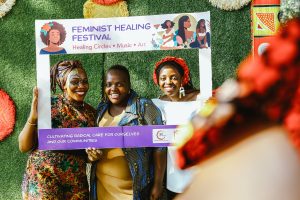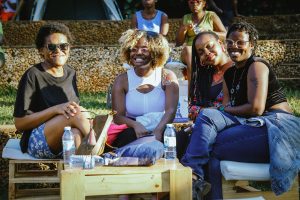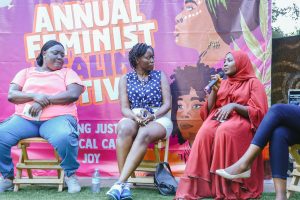The Feminist Healing Festival on Radical Care | Recap
 25 January 2024
25 January 2024
As part of the efforts to eliminate violence perpetrated by men against women and girls, civil society organizations, feminist movements, individuals and collectives globally observe the 16 days of Activism campaign between 25th November to 10th December annually.

As part of the efforts to eliminate violence perpetrated by men against women and girls, civil society organizations, feminist movements, individuals and collectives globally observe the 16 days of Activism campaign between 25th November to 10th December annually. During this time, they raise awareness about the gender-based violence faced by marginalized groups and foster collaboration among various civil society organizations and GBV activists to unite in promoting the same message.
On 1st December 2023, Akina Mama wa Afrika and the GBV Prevention Network with the support of Make Way held a feminist healing festival themed, “Cultivating Radical Care for ourselves and our communities,” as part of the 16 Days of Activism global campaign. The festival theme was inspired by the recognition that building effective systems of radical care for individuals and communities is not only crucial in the aftermath of violence but is also key in eliminating the violence that is perpetrated against women and girls.
Amidst the food, music, and art, conversations around practices of radical care and the gaps that need to be filled were held. The conversations were steered by a panel consisting of; a Doula providing maternal health care to women from low-income communities; a sex therapist using the internet to de-stigmatize and create a healthy sex culture; a clinical psychologist providing individual and group therapy to communities; an activist running a domestic shelter for marginalized women, and an activist working to eliminate sexual and gender based violence.

Sharing experiences and expertise from their various practices, the resounding message at the festival was that we need to reclaim systems of care from the capitalist and profit-centered structures to foster inclusion, especially of economically disadvantaged people.
The panelists also emphasized the need for women and girls to view their identities outside of the labor they provide and the societal constructions around motherhood and marriage. This, then helps us to understand ourselves and our unique needs better. The conversation culminated in an exchange of resources where individuals can access care for their mental wellness, support systems that exist for victims and survivors of gender-based violence, and contacts for needs around sexual and reproductive health.
As part of the festival, a guide with radical feminist care practices from African activists was launched and shared to further inspire the establishment of sustainable and inclusive care institutions.
You can access the care guide here: From an African Feminist Kitchen: Recipes for Radical Care




